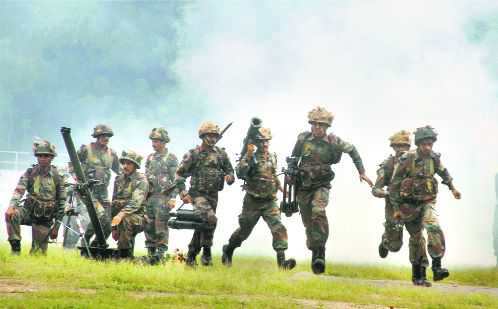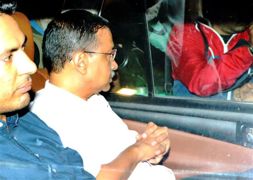
NO CHOICE? Left to it, the Army would have preferred to maintain secrecy as it has done in the last 60 years astride the LoC.
Maj Gen Ashok Mehta (Retd)
Former GoC, IPKF, Sri Lanka
Two and a half years after its execution, the key architect of the military operation, former Northern Army Commander, Lt Gen DS Hooda finally said this month at a military literature festival that surgical strikes were hyped and politicised: ‘If you start having political resonance in military operations, it is not good’.
The common malady among senior military commanders and service chiefs has been their failure to provide prudent advice to the political leadership on military operations. Instead of waiting for 30 months, Lt General Hooda and other commanders in the loop should have warned Prime Minister Modi against turning military strikes into a political football as he and his party have done by keeping operations under wraps. Lt General Hooda said: ‘In hindsight, it would have been better had we done surgical strikes secretly’.
Rewind to September 2016. Modi’s decision to go public was contingent upon two factors: no casualties and no escalation. Surgical strikes were kept below this threshold by targeting terrorist launch pads, not army posts. When the two conditions were met, it was Modi, not Army Chief Gen Dalbir Singh or Lt General Hooda who decided on announcing the successful launch and recovery of Special Forces. It was a calculated risk that Modi used to his political advantage. Left to it, the Army would have preferred to maintain secrecy as it has done in the last 60 years astride the LoC.
Instead of dissuading the government from, in Lt General Hooda’s words, ‘employing the constant hype’ of surgical strikes (politically flogged for two and a half years) the military leadership went along with the politicisation of operations (and the Army) to the detriment of established military norms and values. After Lt General Hooda set the cat among the pigeons, Army Chief Gen Rawat was the first to intervene: dismissing his observations as ‘individual perceptions’ and ‘personal views’. Almost synchronised were comments lauding the operations by two other military commanders — Vice-Chief of the Army Staff, Lt Gen Anbu, and Northern Army Commander Lt Gen Ranbir Singh, who was the pivot to the surgical strikes as then DGMO.
Never before has a single modest operation been politically milked as much as to make the government order the Army to commemorate the second anniversary countrywide without celebrating its first anniversary. The Army should have resisted that. When Lt Gen Hooda was asked what about the need to hype the operation, he said: ‘This should be asked of the politicians.’ A similar but more spectacular raid inside Myanmar against NSCN-K rebels who had ambushed a Dogra Battalion patrol was also needlessly hyped and politicised. If the military was not so subservient to the political and bureaucratic class, the Army high command should have emphatically informed the political leadership of the present and real danger of hyping surgical strikes which instead of retarding infiltration and curbing terrorism as claimed, have only given a leg up to both.
In October 2016, Uttar Pradesh was warming up to the Assembly elections. Posters and banners began appearing in Lucknow glorifying the surgical strikes. Emblazoned on them were three pictures: Lt Gen Ranbir Singh flanked by Modi and Amit Shah. Defence Minister Manohar Parrikar was supervising preparations of election rallies. He had been taking credit publicly for preparing the Army for more than one year for operations, invoking in soldiers the ‘Hanuman’ spirit.
A few days later, Modi was hailed in Lucknow as the ‘conqueror in chief’ and awarded the war mace. In the ceremonies that followed, surgical strikes were billed as the BJP’s single biggest achievement with Modi its tallest leader. The Army did not demand the recall of the offending posters and banners.
The BJP chief, Amit Shah, also made no bones about using the surgical strikes to further his party’s political fortunes. Rarely did an election rally addressed by Modi or Shah not seen prominent mention of surgical strikes. While praise for the jawans was in the passing, the party leadership’s deification was supreme. RSS chief Mohan Bhagwat also does not shy away from comparing Swayamsevaks with a regular Army.
Modi has secured political dividends from the Doklam standoff too. On October 4, 2017, while addressing the Institute of Company Secretaries of India, he indulged in subtle self-praise over India’s capability of standing up to China, drawing a leaf from the Mahabharata. Doklam was invoked at political rallies but did not find the resonance of surgical strikes. Since then, demonetisation and Yogi Adityanath’s insertion in recent state elections have attracted the sobriquet of surgical strikes, both with negative consequences.
Senior IAF officers were asked to publicly justify at a seminar the Rafale contract, the pricing and choice of offset partners. During Defence Minister Sitharaman’s regurgitation of these issues, the Chief or Vice-Chief of Air Staff was deployed beside her. The former has even endorsed the Supreme Court judgment when he should have avoided entering the political domain.
Former Deputy NSA Arvind Gupta who now heads the BJP’s Vivekanand Foundation had the courage to write in his recent book How India Manages its National Security, that political parties (read BJP) freely used the Army’s name in UP state elections which is dangerous politicisation of the Army’s surgical strikes. For the political leadership Lt General Hooda’s afterthoughts on surgical strikes (and military operations) carry a statutory warning: Do Not Politicise. Equally, senior military commanders have a constitutional duty to deter political leaders from crossing military red lines. The use-by date of surgical strikes was long over.



























